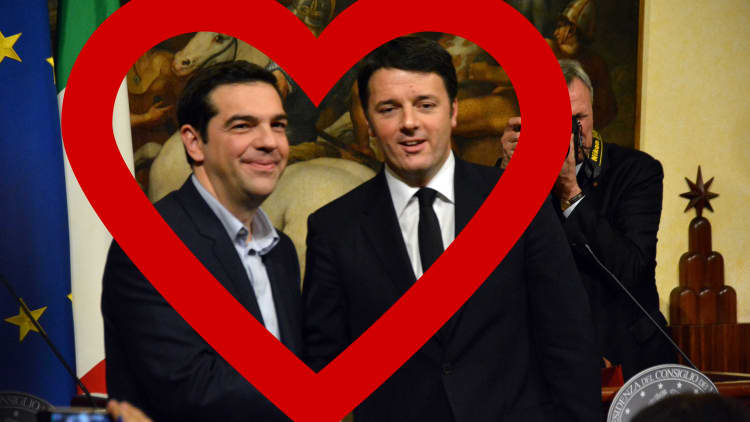Talks between the new Greek government and European institutions about overhauling the country's bailout program showed a degree of thawing in relations Wednesday but are still a long way off a solution.
Greek Prime Minister Alexis Tsipras met with European Commission President Jean-Claude Juncker and the president of the European Union's parliament, Martin Schulz, in Brussels.

Speaking at a press conference after their talks, Schulz said that Tsipras' trip around Europe showed that Greece wanted to embrace the region, rather than separate itself from it. He added that "both sides are fighting for mutual understanding" and both had to find compromises in negotiations over Greece's bailout program.
Schulz added, however, that "it is a difficult time again and we don't yet have the necessary solutions."
For his part, Tsipras said that the history of the EU was one of disagreements that ended in compromise and agreements.
"We have the willingness to find a mutually acceptable agreement and compromise for our common future," he said.
Also on Wednesday, Tsipras met with French President Francois Hollande in Paris. After the meeting, Tsipras voiced confidence that a debt deal would be reached.
"I am convinced we can work together (with European partners) to get out of the crisis in Greece," he said in a statement, according to Reuters.

The meetings came after Greece's Finance Minister Yanis Varoufakis proposed a swap of outstanding debt for new growth-linked bonds on Monday. The proposals are a step back from earlier demands by the new, left-wing government, for a debt haircut – something that European leaders have consistently ruled out.
On Wednesday, Varoufakis met Mario Draghi, president of the European Central Bank (ECB)
Making a statement after the meeting, Varoufakis said discussions had gone well and the two parties had "established line of communication."
"We had a very fruitful discussion and exchange concerning the constraints, the rules, the regulations, the process by which the relationship between Greece the euro zone and of course the central bank must unfold."
He said that an attitude of "business as usual" was not possible for Greece as the country's bailout program was "causing a major humanitarian crisis."
He said he travelling on to Berlin to meet Finance Minister Wolfgang Schaeuble on Thursday.
Despite the friendlier comments coming out of Brussels today, analysts have warned of "challenging" discussions ahead.
Read MoreUK warns Greek debtrow 'biggest risk to global economy'
Despite Greece the toning down of the anti-bailout rhetoric, it is unclear whether the so-called troika which oversees Greece's 240 billion euro ($357 billion) bailout program and financial aid – comprised of the European Commission, ECB and International Monetary Fund – would accept the proposals.
Michala Marcussen, global head of economics at Societe Generale, warned that negotiations between the two parties were bound to be difficult.
"We have seen some more compromising sounds come out in the last couple of days, so that at least is something on the positive front. But I think there are really a lot of parameters that make it very challenging," she told CNBC Wednesday.
"Giving Greece some kind of relief on the debt means further extending the maturity and somehow trying to reduce already very low interest rates. There's a lot of technicalities around the debt (too) and it still leaves you with a very large debt stock."
Read MoreGreek stocks surge10% on 'creative' debt plan
Furthermore, there is also the problem of marrying leading party Syriza's economic "philosophy" – focussed on the winding back of structural reforms – and that of its international creditors.
Germany, for instance, has been very vocal in opposing Greek debt restructuring. On Tuesday, Chancellor Angela Merkel said she was withholding judgement, telling a news conference: "We are waiting for proposals and then we will enter talks...I don't want to comment individually on all the details that are being disseminated," Reuters reported.
Moral hazard
Greece's international bailout expires at the end of this month, and to tide the country over for the next three months while a new bailout program is agreed, the Financial Times reported.
Whether the ECB cuts off support or not, Greece's creditors know that whatever it decides for the Greece could have wider ramifications, with fellow euro zone countries Ireland, Spain and Portugal also recipients of European aid.
As such, there are worries that a restructuring of Greece's debt could set a worrying precedent for other euro zone countries. One analyst warned the negotiations carried the potential for "moral hazard" -- when one party will take more risks knowing that another party will bear the brunt of those risks.

Francesco Castelli, chief information officer of investment banking firm Method Investments & Advisory, warned that the negotiations carried the potential for a "moral hazard" -- when one party takes more risks knowing that another party will bear the brunt of those risks.
"The big problem here is moral hazard. If Greece gets a big debt reduction then Spain and Podemos (the country's left-wing, anti-bailout party) will also say: 'We want a 50 percent reduction'," he told CNBC Wednesday.
But Castelli conceded that Greece was in a "very difficult situation."
"They don't have the money to pay back debt, they don't have growth, so for sure everyone knows we will need to find a way to give a small rescheduling to (the debt program)," he told CNBC Europe's "Squawk Box."
Germany and Greece remained poles apart over Greek debt, he warned, and as a result, negotiations were likely to be, "a long process, long process."
- By CNBC's Holly Ellyatt, follow her on Twitter @HollyEllyatt. Katy Barnato contributed to this report.


